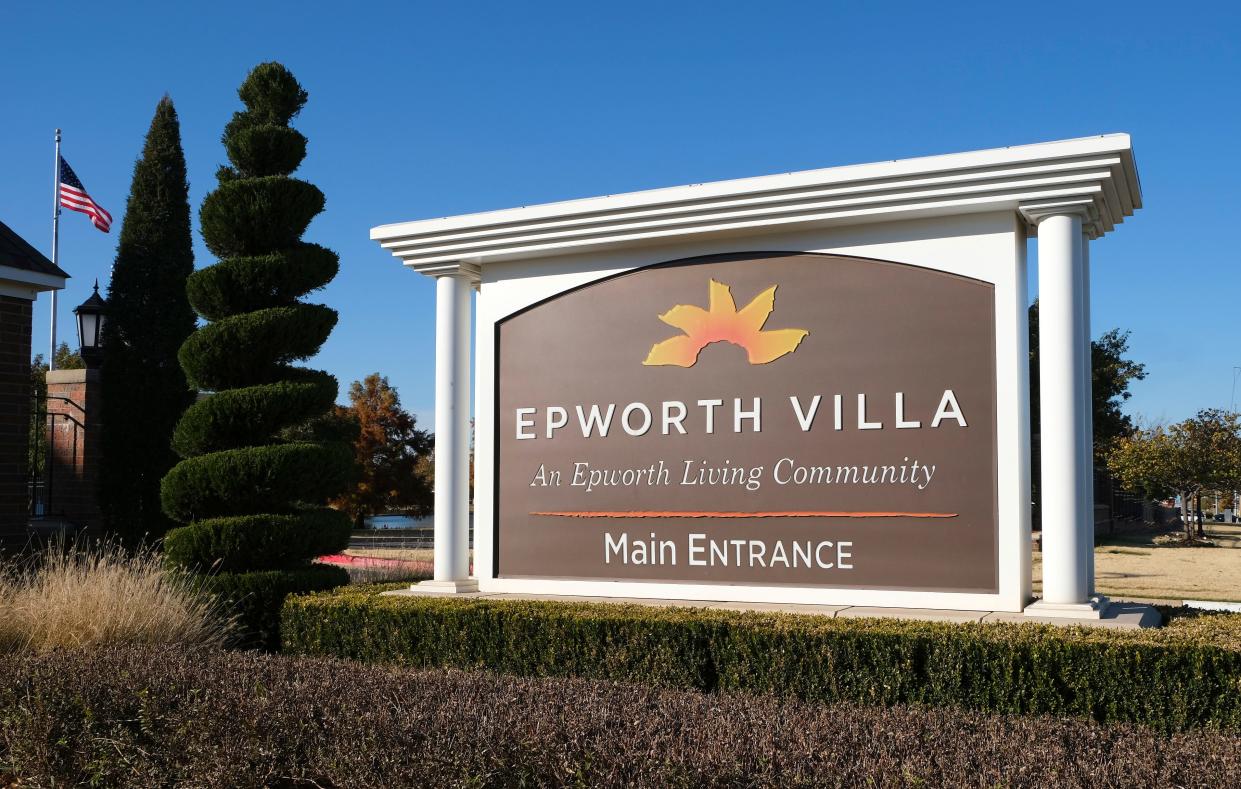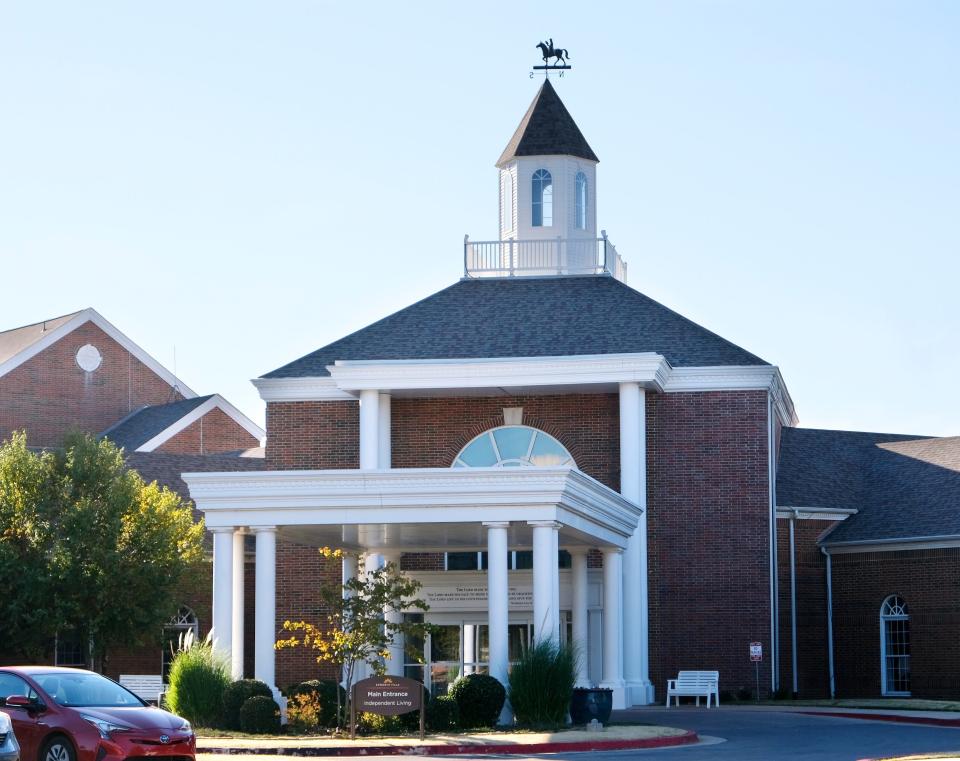Oklahoma County will issue $80 million in bonds to help struggling retirement center

- Oops!Something went wrong.Please try again later.
Oklahoma County commissioners on Wednesday helped a nonprofit retirement center in north Oklahoma City move closer to exiting bankruptcy.
Commissioners unanimously approved a resolution that could enable Epworth Villa to reorganize its debt using $80.5 million in tax-exempt bonds issued through the county's finance authority. The finance authority also will issue an additional $6 million in bonds so that the retirement center can improve its facilities.
County officials and attorneys said the move does not equate to a bailout and that it is perfectly legal. United States tax code, according to an attorney representing Epworth, allows for government entities to serve as tax-exempt bond issuers on behalf of nonprofit organizations that provide retirement-related care.
Officials said as part of Epworth Villa's bankruptcy exit plan, the new bonds will be offered to investors who already hold Oklahoma County Finance Authority bonds issued on Epworth Villa's behalf in 2004, 2005 and 2012.
What we know about Epworth Villa, its bankruptcy filing
At the time of its bankruptcy filing in September, Epworth Villa had 401 residents at its facility, which offers independent living, assisted living, memory care assisted living, skilled nursing, rehabilitation, respite and long-term care.
Epworth Villa, an extension ministry of the Oklahoma Conference of the United Methodist Church, has a staff of about 345, with nearly 300 of those paid hourly.
Epworth Villa filed for bankruptcy protection because of operational challenges presented by COVID-19, lockdowns and other related issues, President and CEO Ron Kelly said.
If Epworth Villa can't exit bankruptcy and continue to make its debt payments, holders of existing bond debt could close the facility, forcing its residents and patients to find other places to receive the care they need. It also could put Epworth Villa's employees out of work.
But Epworth Villa's bond attorney doesn't believe that would happen.
"Instead of having debt that perhaps is not going to be paid in full, they have the ability to get new bonds that, if Epworth can get back to running, will offer them chances to get paid," said Attorney John Weidman, with Hilborne & Weidman of Tulsa.
Oklahoma County taxpayers will not be on the hook for old or new bonds issued to Epworth Villa, said J. Kelly Work, the county finance authority's attorney.
The retirement center is using the facility, at 14901 N Pennsylvania Ave., as collateral. If Epworth Villa were to default, investors would seize the property and auction it off to recover their losses.
Epworth Villa also filed for Chapter 11 bankruptcy protection in 2014, after a multimillion-dollar judgment in a lawsuit, which company officials say later was reversed upon appeal.
Epworth Villa has a history with Oklahoma County bonds
Epworth Villa first sought bonds through the county in 1989, when Oklahoma County commissioners authorized the sale of $33 million in bonds to help with construction of the facility. Commissioners at the time also approved issuing $22 million in bonds for retirement villages and nursing homes under what was known at the time as the Baptist General Convention of Oklahoma.
In 1993, commissioners authorized another bond sale for Epworth that enabled it to retire the original bonds, saving the operation about $200,000 in annual interest payments.
Epworth Villa-related bond sales also were made by the county's finance authority in 2004, 2005 and 2012.
What other nonprofits have used bonds from Oklahoma County?
Work, the finance authority's attorney, said the agency has helped school districts and nonprofits access tax-exempt bonds to pay for their projects within Oklahoma County since the early 1980s.
Other nonprofit entities taking advantage of using the county's finance authority to raise funds through tax exempt bonds include Science Museum Oklahoma, the Oklahoma City-County Health Department and numerous school districts that used the revenues to accelerate building programs associated with bond issues approved by voters, Work said.
Tax-exempt bonds are popular with borrowers because the interest they owe to investors is less than what they would owe if traditional financing were used. Tax-exempt bonds are popular with purchasers because they don't have to pay taxes on their returns.
Most traditional investors are bond funds, insurance companies and banks.
"The benefit broadly is economic development within Oklahoma County and its citizens through the creation of cultural, health and educational facilities," Work said.

What does U.S. tax code say about using bonds to help Epworth Villa?
Attorney John Weidman, with Hilborne & Weidman of Tulsa, said the use of bonds is covered in the U.S. Internal Revenue Service's tax codes.
The code allows for governmental taxing entities to serve as tax-exempt bond issuers on behalf of 501-C-3 organizations for qualified purposes, said Weidman, who is serving as Epworth Villa's bond counsel for the pending transactions.
The use of tax-exempt municipal bond financing began in the 1960s with nonprofit hospitals, higher education institutions and other large entities.
There are about $3.5 trillion in outstanding tax-exempt municipal bonds nationally, with an annual issuance of about $300 to $400 billion. The nonprofit senior living industry, of which Epworth Villa is a part, contributes about $5 billion to this yearly issuance, he said.
Funds generated from the sale of tax-exempt municipal bonds must be allocated for qualified purposes, such as the acquisition, construction or improvement of facilities serving public or charitable purposes.
Other acceptable uses for such bonds include educational and transportation-related purposes, Weidman said.

Bonds integral part of Epworth's reorganization
A reorganization plan involving the bonds the county authorized Wednesday was filed in bankruptcy court on Nov. 13 and was the product of discussions between Epworth's leadership and bond holders, Weidman said.
Weidman said bond holders still must vote to approve the deal, and predicted they most likely would because it enables them to continue to have a collateral-guaranteed investment.
If bond holders approve the deal, Weidman said hopes are the bankruptcy judge would approve Epworth's bankruptcy exit in December.
"Are we there today? No. Are we a step closer? Yes," he said.

This article originally appeared on Oklahoman: How Oklahoma County is helping Epworth Villa exit bankruptcy

